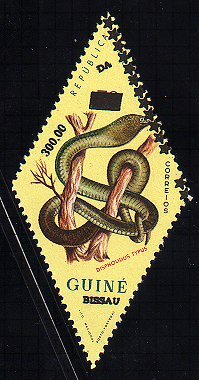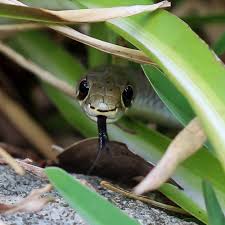Stamp: Dispholidus Typus (Guinea-Bissau 1987)
Dispholidus Typus (Guinea-Bissau 1987)
01 July (Guinea-Bissau ) within release Dispholidus Typus goes into circulation Stamp Dispholidus Typus face value 300 Guinea-Bissau peso
| Stamp Dispholidus Typus in catalogues | |
|---|---|
| Michel: | Mi: GW 921 |
Stamp is square format.
|
Data entry completed
50%
|
|
|---|---|
| Stamp Dispholidus Typus in digits | |
| Country: | Guinea-Bissau |
| Date: | 1987-07-01 |
| Print: | Offset lithography |
| Emission: | Commemorative |
| Format: | Stamp |
| Face Value: | 300 Guinea-Bissau peso |
Stamp Dispholidus Typus it reflects the thematic directions:
Snakes are elongated, limbless reptiles of the suborder Serpentes Like all other squamates, snakes are ectothermic, amniote vertebrates covered in overlapping scales. Many species of snakes have skulls with several more joints than their lizard ancestors, enabling them to swallow prey much larger than their heads (cranial kinesis). To accommodate their narrow bodies, snakes' paired organs (such as kidneys) appear one in front of the other instead of side by side, and most have only one functional lung. Some species retain a pelvic girdle with a pair of vestigial claws on either side of the cloaca. Lizards have independently evolved elongate bodies without limbs or with greatly reduced limbs at least twenty-five times via convergent evolution, leading to many lineages of legless lizards. These resemble snakes, but several common groups of legless lizards have eyelids and external ears, which snakes lack, although this rule is not universal (see Amphisbaenia, Dibamidae, and Pygopodidae).

